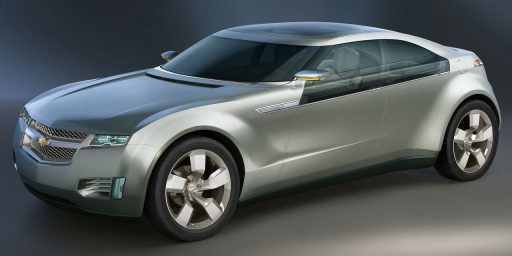McCain Proposes Prize for Battery Breakthrough
John McCain has proposed offering a $300 million dollar prize to the developer of “breakthrough battery technology.”
Senator John McCain on Monday proposed the creation of a $300 million prize for anyone who developed breakthrough car-battery technology and he recommended greater tax incentives for buyers of nonpolluting autos, saying that only a combination of increased oil production, conservation measures and ingenuity could ease the fuel crisis and slow global warming.
[…]
Perhaps McCain’s most striking proposal was the $300 million prize “for the development of a battery package that has the size, capacity, cost and power to leapfrog the commercially available plug-in hybrids or electric cars.”
That’s not a bad idea, assuming that the prize conditions are well defined. I’ve always preferred the incentive approach to research as opposed to direct subsidies. Plus, if the car battery principles can be applied to other energy storage, it might help boost the transition to fluctuating power sources such as solar and wind.
(link via Balloon Juice)





The problem with this proposal is that the inventor of such a battery would stand to gain much, much more than $300 million just from marketing the device. The financial incentive for battery development is clearly there already. So what does the “prize” add?
Jeff,
Even if the battery is developed, there is still the risk that it won’t sell for one reason or another and recovering a big chunk of the development money is an incentive alone.
In addition, when you’re trying to direct peoples’ innovation and/or research this far ahead, a prize seems to bring people out of the woodwork to put forward their ideas.
I agree with Alex. These prizes can make more sense than just funding research. The prize is a tangible carrot propelling those who would not otherwise take up the task.
The prize pays when you have a prototype, the market only pays when you have demand and production. It’s the difference between getting $300k after 1 year, or $3m after 5 years. Sure the $3m over 5 years is more money, but investors would like the possibility of return (or at least reduction in debt) after only 1 year.
Take the Ansari X prize that gave us the first privately built space vehicle. It cost way more to develop than the prize paid out, and stands to gain way more in revenue from the technology in the future, but it took the competition for the prize money to spur the initial investment.
…and what if the Energizer Bunny or Duracel company wins?
We could probably use the prize model to promote the development of a bunch of different alternative energy technologies. I think there was a bill a while back that was trying to set up an “H-Prize” for the development of hydrogen fuel cells. Not sure what happened to it.
This is one of the ideas from McCain I’ve kinda liked. But… why a battery, specifically? Matt’s right: Hydrogen powered vehicles could benefit from this sort of incentive at least as much, and there are probably other options too. $300 mil could also subsidize the first generation of Honda FCX’s pretty nicely (or a Detroit version, if they have one), and some of the incentives around getting hydrogen filling stations created.
Is he serious about solving the problem? Seems like a half-baked stunt to exclude something so obvious. Sad, too, because I want to like him.
The problem with hydrogen is that thermodynamics is completely against it. Compressing the hydrogen to such a degree that it represents a useful vehicle fuel requires a tremendous energy input, making hydrogen an uneconomic way of fueling your vehicle. By contrast, the theoretical power density of batteries is quite high.
Theoretically you can regain that energy when you decompress it, so that the only net loss is due to the inefficiencies of your pump. Still, the main heat loss is in the creation of the hydrogen in the first place, since it’s not readily available in gaseous form.
Batteries have the same problem, it takes more energy to charge a battery that is will discharge, plus you have breakdown of the chemicals in the battery itself. Super-capacitors may be a more efficient alternative.
Another problem with hydrogen is the lack of infrastructure to transport it to where it will need to be distributed. We already have a distribution infrastructure for electricity (although likely new “outlets” will need to be put in place).
I say if an inventor comes up with a super capacitor that meets the “battery package” requirements, she ought to get the $300 million.
There is technology in the works to use CO2 to convert Hydrogen gas into hydrocarbon gas, which could be transported using existing pipelines to people’s homes. Anybody with a gas furnace or oven could then re-fuel their vehicles at home from the same source. The bonus of this is that it could be carbon negative, removing greenhouse gases while providing a usable fuel.